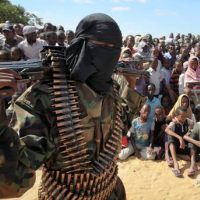Kidnapping Terror Suspects in Africa…U.S. Goes 1 for 2
 Shabab Rally in Mogadishu (AP Photo)
Shabab Rally in Mogadishu (AP Photo)
Viewed through the prism of the baseball playoffs now in full swing, the Obama administration’s dual kidnapping attempts of terrorism leaders over the weekend went 1 for 2. Washington scored a hit when it captured an al-Qaeda mastermind accused of being responsible for the 1998 bombings of two American embassies in Africa. But the administration also struck out when it sent the prize of U.S. Special Forces into Somalia to capture another wanted terror leader, and came away empty-handed.
Given the highly publicized mission that took out Osama bin Laden two years ago, American commandoes—particularly the Navy SEALs—have taken on a reputation of near invincibility when it comes to going after terrorist threats. That’s why batting .500 can seem disappointing under the circumstances.
“The reality is that there’s no such thing as 100 percent success except in the movies,” a defense official who asked not to be named told The New York Times. “This was a better-than-average day.”
On the plus side, the U.S. apprehended Nazih Abdul-Hamed al-Ruqai, better known as Abu Anas al-Libi, from outside his home in Tripoli, Libya. He had been sought since his indictment in 2000 for planning the attacks on the U.S. embassies in Kenya and Tanzania.
Abu Anas was reportedly living in the open in Libya, where the post-Gaddafi government has been criticized for becoming a potential haven for terrorists.
The same has been said about Somalia, from which the al Qaeda-linked Shabab has operated, including the recent attack on a Kenyan mall.
But the Somalia operation proved tougher than anticipated for SEAL Team 6, the same group that killed bin Laden. The commandoes arrived by sea and stormed a villa where a Shabab leader, Abdulkadir Mohamed Abdulkadir, also known as Ikrima, was reportedly staying.
Heavy gunfire from militants forced the SEAL Team to withdraw without capturing their man this time. U.S. officials in charge of the raid reportedly declined the aid of air strikes because of the presence of many women and children in the compound.
“The latest chapter in President Obama’s efforts to combat Al Qaeda and its loose affiliates turned out to be a tale of two raids, one that succeeded and one that did not,” the Times’ Peter Baker and David Sanger wrote. “But the failure of the Somalia operation underscored the limits of America’s power even for one of its most storied military units.”
Obama made no comment following the raids.
An administration official admitted privately that the Somalia operation “did not achieve the objective.” The official added that the Pentagon was trying to figure out what went wrong and “who dimed out who,” an indication that there may have been disagreement within the administration over the mission.
-Noel Brinkerhoff
To Learn More:
Raids Show the Limits of U.S. Military Strikes (by Peter Baker and David Sanger, New York Times)
Heeding New Counterterrorism Guidelines, U.S. Forces Backed Off in Somalia Raid (by Karen DeYoung, Washington Post)
Abu Anas al-Liby in US Custody Following 15-year Manhunt (by Kevin Rawlinson, The Guardian)
Capture of Bombing Suspect in Libya Represents Rare ‘Rendition’ by U.S. Military (by Ernesto Londoño, Washington Post)
- Top Stories
- Unusual News
- Where is the Money Going?
- Controversies
- U.S. and the World
- Appointments and Resignations
- Latest News
- Musk and Trump Fire Members of Congress
- Trump Calls for Violent Street Demonstrations Against Himself
- Trump Changes Name of Republican Party
- The 2024 Election By the Numbers
- Bashar al-Assad—The Fall of a Rabid AntiSemite






Comments